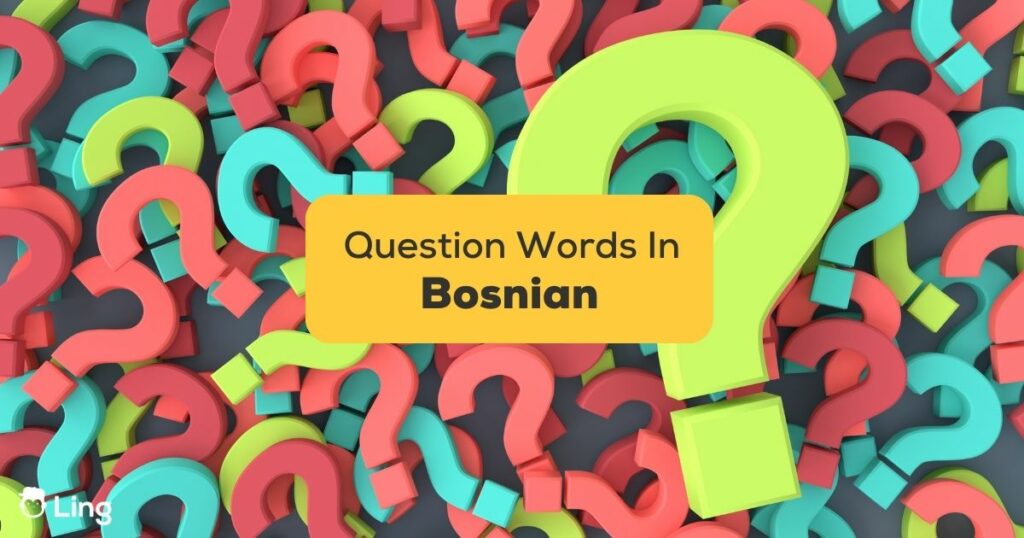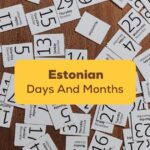Ever wondered about those intriguing ‘question words in Bosnian‘ that keep popping up in cultural discussions and language forums? Well, grab your virtual backpack and favorite snack because we’re about to go over the intricacies of this grammar point in this article! If you’ve ever been hit with a serious case of wanderlust or just have an insatiable curiosity about languages (who doesn’t, right?), this guide on Bosnian question words will be your newest obsession. Let’s begin!
In my early days of exploring Bosnia, I distinctly remember wandering through the enchanting streets of Sarajevo. I was trying to find a local cafe I had heard raves about, but alas, my map wasn’t helping much. Gathering up the courage, I approached a local, asking, “Gdje je kafana Miris?” using the question word for “where.” The man’s eyes lit up, not just because I asked for directions but because I did so in his language.
And guess what? Something magical happened…
We ended up having a delightful chat, with him using “Šta” to ask what I wanted to drink and “Zašto” to delve into why I was visiting Bosnia. If I hadn’t known these question words in Bosnian, I might’ve found the cafe eventually, but I would’ve missed out on a spontaneous connection and an unforgettable conversation. It’s moments like these that remind me of the incredible value of understanding even the basics of a language. It’s more than just communication; it’s a bridge to genuine human connections.
Want to also ensure that you understand how these question words in Bosnian can help you out? Read on below!

The Role Of Questions In The Bosnian Language
Questions, the key to unlocking conversations, play a pivotal role in the Bosnian language, much like they do in any tongue. They are gateways to understanding, diving deep into the heart of matters, and to forging connections that transcend basic interactions. In Bosnian, the structure and usage of questions deserve special attention.
There are primarily two types of questions in Bosnian:
- Yes or No Questions: As straightforward as they sound, these questions demand only a simple affirmation or negation. The beauty of Bosnian is in its clarity, and here, the answers are direct: “da” (yes) and “ne” (no). When you pose a question like, “Jeste li gladni?” (Are you hungry?), the response you’re seeking is either a “da” if the person is indeed hungry or a “ne” if they’re not.
- Informational Questions: Moving beyond the binary of yes or no, these questions seek detailed responses. Using words like “Kako” (How?), “Šta” (What?), “Gdje” (Where?), and “Kada” (When?), they delve into the specifics, the nuances, the fine details of a situation or a narrative. For instance, asking “Kako se zovete?” (What’s your name?) warrants a more elaborative response than a simple yes or no.

Question Words In Bosnian
Venturing into the realm of the Bosnian language, one quickly realizes the significance of question words. These essential terms act as bridges to understanding, aiding in extracting specific information from conversations. To truly grasp the heart of Bosnian conversations, becoming familiar with these question words is indispensable. Let’s explore these terms and their English counterparts.
| English | Bosnian |
|---|---|
| What | Šta |
| When | Kada |
| Where | Gdje |
| Where from | Odakle |
| Where to | Kuda |
| Which | Koji |
| Who | Ko |
| Whose | Čiji |
| Why | Zašto |
It’s not enough that you know the basic translations. Let’s get to know the 5W’s and H’s better in the sections below.
Who
The Bosnian word “Ko” is used to inquire about a specific person, role, or characteristic in general. Here are a few question-based sentences that show how you can use this simple word:
- “Ko je on?” – “Who is he?”
- “Ko dolazi na večeru?” – “Who is coming for dinner?”
- “Ko ti je najbolji prijatelj?” – “Who is your best friend?”
- “Ko je pobijedio na natjecanju?” – “Who won the competition?”
- “Ko te naučio plivati?” – “Who taught you to swim?”
Through these examples, it becomes evident how the word “Ko” seamlessly integrates into various contexts, always centering the question on the identity or role of a person.
What
The Bosnian word “Šta” is used to inquire about a specific object, action, idea, or concept in general. Here are some sentences that show how you can use this simple word:
- “Šta je to?” – “What is that?”
- “Šta radiš?” – “What are you doing?”
- “Šta želiš za ručak?” – “What do you want for lunch?”
- “Šta misliš o ovome?” – “What do you think about this?”
- “Šta se dogodilo?” – “What happened?”
These examples shed light on the versatility of the word “Šta,” making it an indispensable tool when trying to gather information or understand a particular subject in the Bosnian language.
Where
The Bosnian word “Gdje” is used to inquire about a specific location, destination, or place in general. Here are a few easy examples that show how you can use this essential word:
- “Gdje si?” – “Where are you?”
- “Gdje živiš?” – “Where do you live?”
- “Gdje smo sada?” – “Where are we now?”
- “Gdje si parkirao auto?” – “Where did you park the car?”
- “Gdje ćeš ići na odmor?” – “Where will you go on vacation?”
Through these illustrative examples, one can appreciate the fundamental role “Gdje” plays in identifying locations and setting contexts within the Bosnian language.
When
The Bosnian word “Kada” is used to inquire about a specific time, duration, or event. Here are a few sentences that illustrate how you can employ this term:
- “Kada dolaziš?” – “When are you coming?”
- “Kada je tvoj rođendan?” – “When is your birthday?”
- “Kada će biti gotovo?” – “When will it be done?”
- “Kada smo se posljednji put vidjeli?” – “When did we last see each other?”
- “Kada će koncert početi?” – “When will the concert start?”
Why
The Bosnian word “Zašto” is utilized to seek reasons, explanations, or justifications. Here’s a glimpse of how you can harness this word in various contexts:
- “Zašto kasniš?” – “Why are you late?”
- “Zašto plačeš?” – “Why are you crying?”
- “Zašto nisu došli?” – “Why didn’t they come?”
- “Zašto je nebo plavo?” – “Why is the sky blue?”
- “Zašto je promijenio mišljenje?” – “Why did he change his mind?”
How
In Bosnian, the word “Kako” is used to inquire about the manner, method, or state of something. Dive into these sentences to see the versatility of this word:
- “Kako si?” – “How are you?”
- “Kako to radiš?” – “How do you do that?”
- “Kako se zoveš?” – “What’s your name?” (Literally, “How are you called?”)
- “Kako je prošao ispit?” – “How did the exam go?”
- “Kako je nastala ova ideja?” – “How did this idea come about?”
Tips For Learning Bosnian Question Words
Mastering Bosnian question words is key to effective communication. Here are some condensed strategies to help you navigate this journey:
- Flashcards: Create cards with English on one side and Bosnian on the other. Review regularly.
- Mnemonics: Link each Bosnian word with a memorable image or rhyme.
- Active Practice: Engage in real-life scenarios, mentally framing questions in Bosnian.
- Listen: Immerse yourself in Bosnian media to recognize words in context.
- Language Exchange: Connect with native speakers to practice.
- Daily Vocabulary: Integrate one question word into your daily speech.
- Visual Aids: Use sticky notes with Bosnian words around your home.
- Teach Someone: Reinforce your learning by teaching another.
Learn Bosnian With Ling
Navigating the waters of a new language can sometimes feel overwhelming, but remember, every expert was once a beginner. The Bosnian language, with its rich tapestry of history and culture, awaits your exploration. If you’re keen on diving deeper and mastering Bosnian more efficiently, we recommend trying out the Ling app. It’s tailored to provide comprehensive lessons, interactive exercises, and real-world scenarios to enhance your learning experience.
So why wait? Unlock the doors to Bosnia’s linguistic treasures today when you download Ling from the App Store or Play Store! Happy learning!



































































